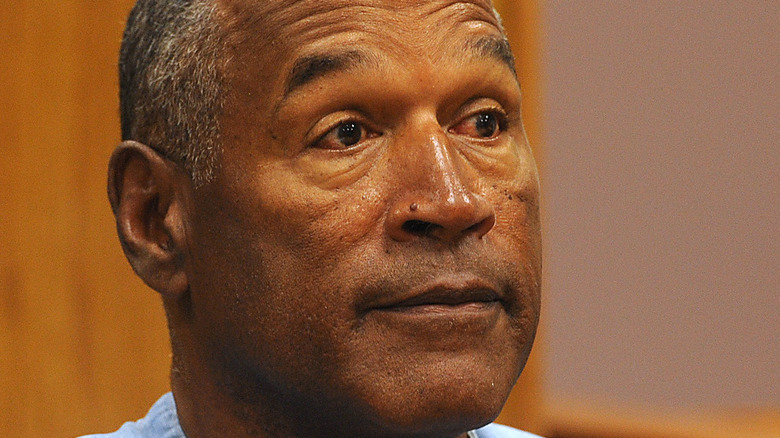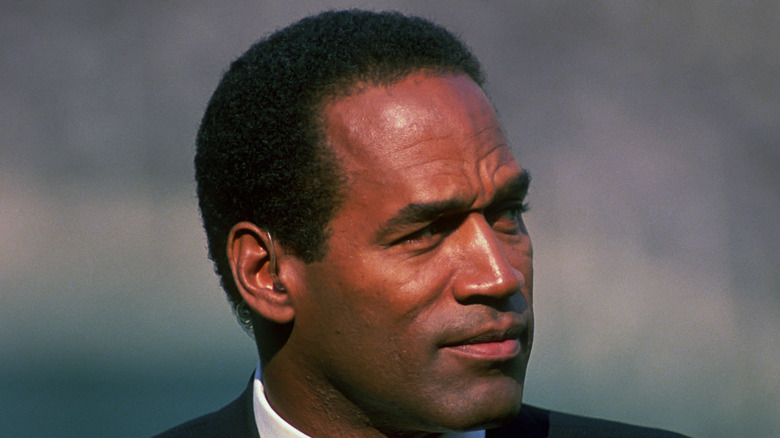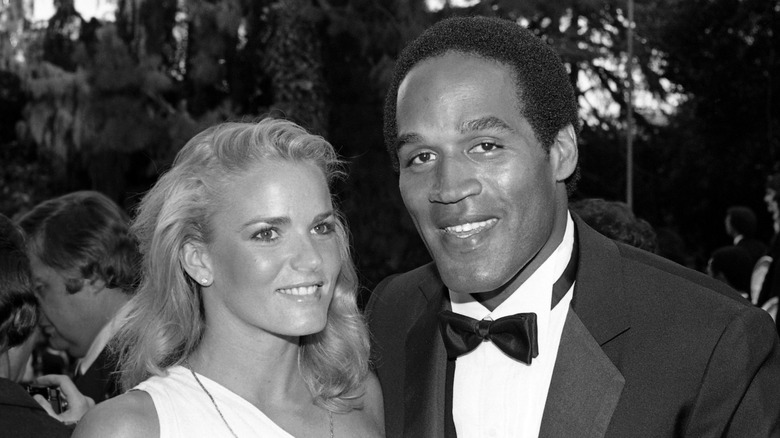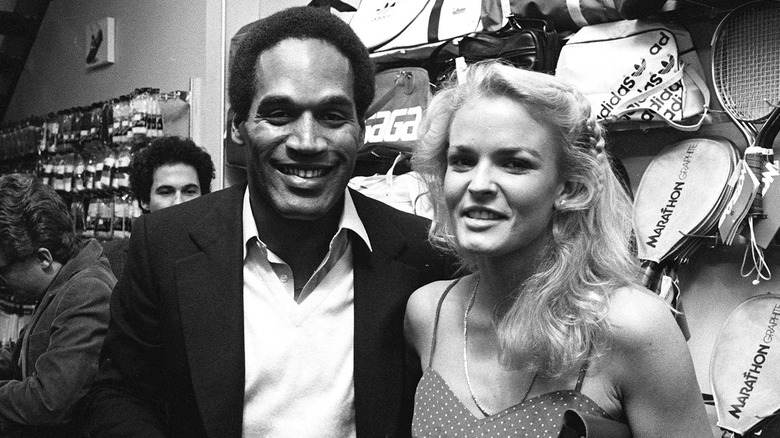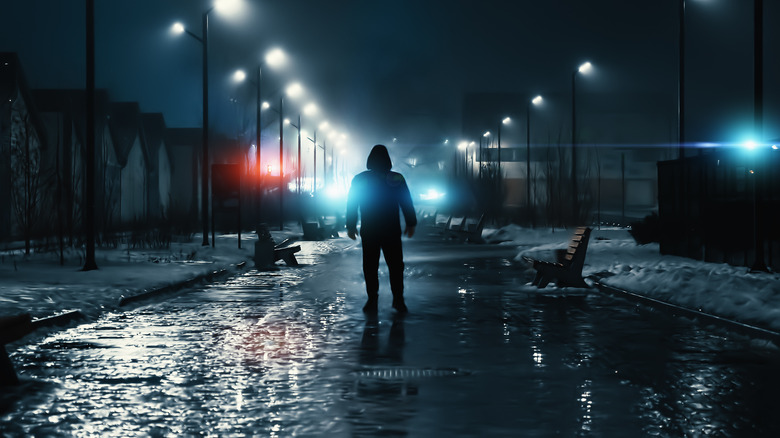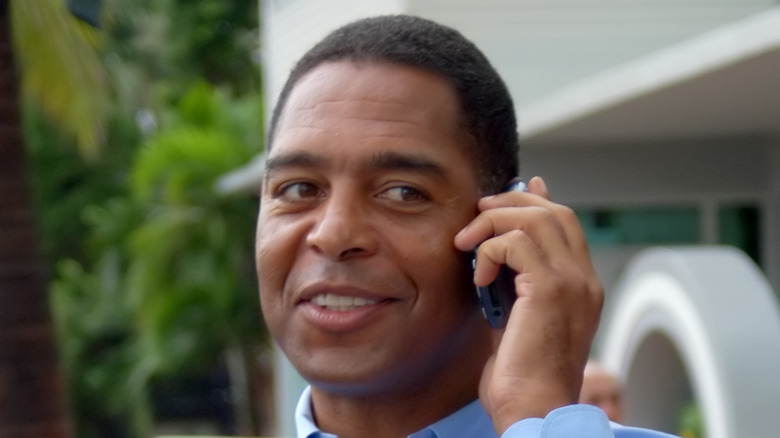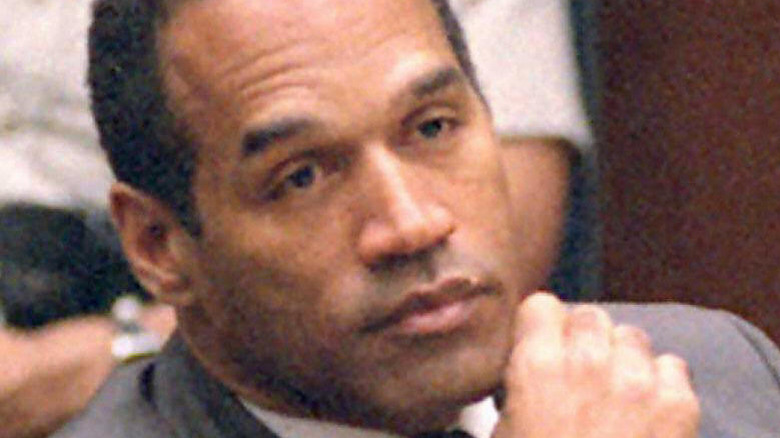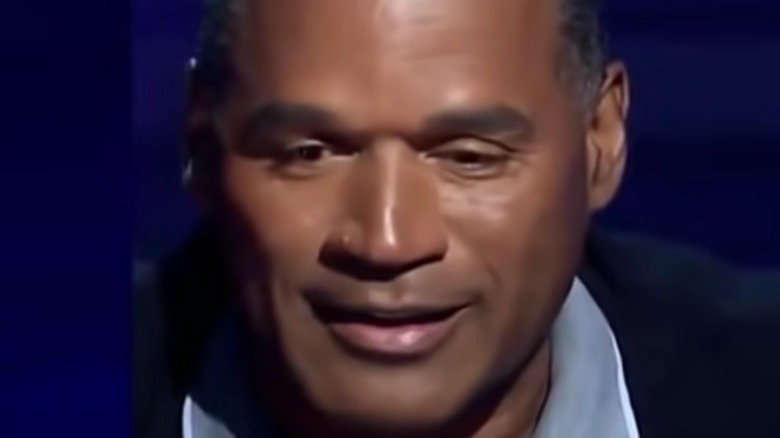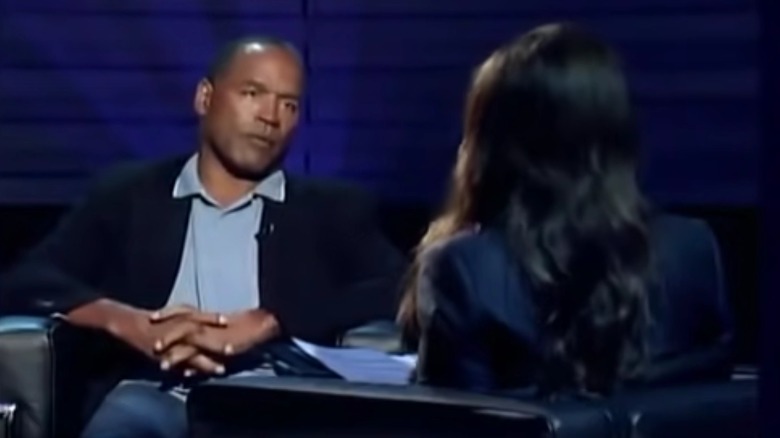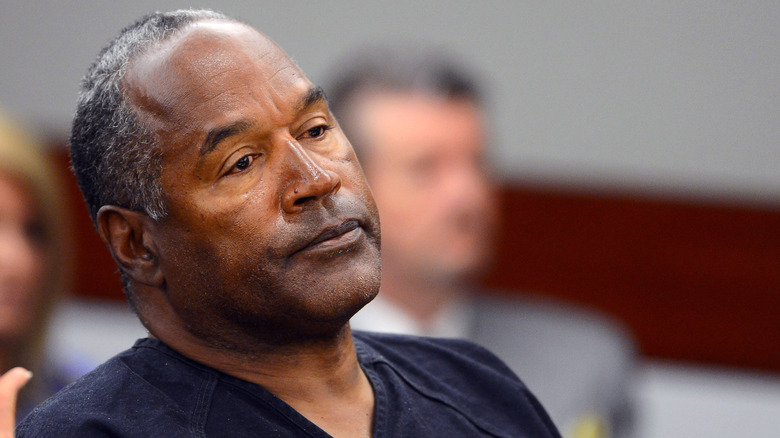Disturbing Details From OJ Simpson's Hypothetical Confession
If you are familiar with O.J. Simpson, you almost certainly know two things about him: He was an NFL Hall of Fame running back, and in the mid-'90s, he was accused and acquitted of the brutal murders of his ex-wife, Nicole Brown Simpson, and her friend Ronald Goldman. It was the "Trial of the Century," in which Simpson's "Dream Team" of attorneys — including Robert Shapiro, Johnnie Cochran, F. Lee Bailey, and Robert Kardashian — faced off against an equally dreamlike prosecutorial team led by Marcia Clark and Christopher Darden. Simpson's acquittal (as you likely recall) shocked the nation, as the mountain of mostly circumstantial evidence against him constituted a pretty darned strong case.
In 2006, Simpson shocked everybody again by announcing a book entitled "If I Did It," in which he presented a supposedly hypothetical account of how he could have committed the crime, which he still maintained he did not do. In advance of its release (which ended up being significantly delayed and its proceeds awarded to Goldman's family), he conducted an interview with the book's publisher, Judith Regan, intended to air on the Fox network. In the face of understandable criticism, the lengthy interview was shelved — until 2018, when Fox aired it as a special with commentary by a panel that included Regan and Darden. Here are some of the more disturbing details of that interview, and also, a warning: we will be wading into some truly dark territory here.
He was still married when he met Nicole Brown
O.J. Simpson's relationship with Nicole Brown began, by his own admission, in a morally questionable fashion. The pair met in 1977 and immediately began dating despite the fact that Simpson was still married to his first wife, Marguerite, with whom he had two children and a third on the way (via The New York Times). In the interview, he claimed that he and Marguerite had decided literally the night before his introduction to Brown that "it wasn't working," but to say that he wasted no time playing the field seems like a bit of an understatement.
To add insult to injury, Simpson said that the day he met Brown while having breakfast at a restaurant with a friend was his and Marguerite's anniversary. To his credit, we guess, he said that he waited three days before returning to the Days Inn where Brown was working to ask her out, with the same unnamed friend in tow. According to Simpson, his buddy told Brown, "This is one of the good guys," which pretty quickly turned out to not exactly be accurate.
He had a very hesitant attitude toward marriage and more kids
The portion of the interview in which O.J. Simpson talked about his courtship with Nicole Brown makes it clear that, although he repeatedly referred to her as the love of his life, he wasn't exactly scrambling to marry her. Judith Regan pointed out that the pair were dating for seven years before getting hitched, although Simpson's divorce was finalized in 1980, according to The New York Times. "I really wasn't looking to get married — most guys aren't looking to get married," he said, in a moment of astounding projection.
Also at issue was the fact that Nicole wanted more kids, whereas Simpson decidedly did not. "I had had three kids ... I wasn't looking to have kids, and then after a few years she mentioned to me that she had been helping me when my kids were with us, raised my kids, so she kind of wanted her own," he said. "Which was a good point to me at the time, but I was still kind of hesitant." He went on to say that this sticking point caused "a lot of friction" between the couple, but that "for the most part," their relationship was just swell.
O.J. Simpson displayed flashes of temper early in their relationship
In the interview, Judith Regan segued quickly from here to a 1984 incident in which O.J. Simpson displayed some inarguably violent and hostile tendencies. "You know, I don't know why this has become such a big deal," Simpson said before explaining his side of the story, which makes it seem like a pretty big deal. "I had committed to a wedding date, but then I did what most guys do" and kept pushing it back, he related, once again painting the majority of the world's men with the same icky brush. "I was sitting on the front of this car — it was actually my car, but I bought it for her," he remembered. "And I had a [baseball bat] between my legs, and as we're talking, it's bouncing off the tire ... and at one point, it hits the rim."
Nicole Brown, who was sitting in the car, then told him (according to Simpson) that he'd have to pay for any damage he did to the vehicle, at which point Simpson retorted, "Well, if I have to pay for that, I guess I have to pay for this, too," and took the bat to "the front of the car." According to the Los Angeles Times, this isn't quite right; at Simpson's trial, it was revealed that he had actually smashed the windshield, and when the cops arrived, he simply told them that it was his car and that there was no problem. This would become a disturbingly regular pattern.
There were prior domestic violence incidents ... but the police didn't always follow through
Later in the interview, O.J. Simpson went into detail about what he called, with a few exceptions, "the most depressing and sad night of [his] life" — New Year's Eve 1989, when one of the couple's frequent arguments got out of control. They were both pretty tipsy, he said, and Nicole Brown had become fixated on a comment made earlier in the evening by Kathryn Edwards, the then-fiancée of his friend, fellow NFL running back Marcus Allen. This comment had to do with some gold earrings that Edwards might have implied that Simpson bought for her, leading Brown to believe that Simpson may have been cheating.
Simpson said that after Brown began pushing him, he threw her out "with no concern for her well-being" after the couple physically fought. "She got physical with me, I got physical with her, and obviously I'm bigger," he said, and the altercation prompted the police to respond. According to the Los Angeles Times, it was a bit worse than what Simpson described: Brown, bloodied and dazed, ran toward officers screaming that Simpson was going to kill her, while Simpson berated them: "The police have been out here eight times before, and now you're going to arrest me for this?" he was quoted as having said in a police report. Of course, in the interview, Simpson denied that the police had responded to his home that many times, and since the 1989 incident was somehow his first arrest, there was no public record to contradict him — only his own words, as noted by the police.
If you or someone you know is dealing with domestic abuse, you can call the National Domestic Violence Hotline at 1−800−799−7233. You can also find more information, resources, and support at their website.
He may have stalked Nicole while their divorce was ongoing
The 1989 incident seemingly marked the beginning of the end for the couple, and they divorced in 1992, according to The New York Times. O.J. Simpson, however, had some trouble letting go. As reported by The Washington Post, Nicole Brown's friends and family claimed during his trial that as their divorce proceedings were ongoing, Simpson stalked his wife along with anyone she attempted to date, even allegedly keeping a notebook in which he tracked her daily routine.
Simpson himself admitted to one incident during the interview, in which he — supposedly by chance, while out with friends — ran into Brown and her then-boyfriend, Keith Zlomsowitch, while out on the town. Simpson admitted that after the encounter, he went to Brown's house, where he saw the pair having, er, an encounter through a window. Then, he said, he "hit the door twice, and left" — for the sole purpose, of course, of alerting her to the fact that she could be seen from outside. Simpson said that it was at that moment he realized that it was truly over and he went home and "slept like a baby." Speaking with Dayton Daily News in 2017, Zlomsowitch characterized the incident a bit differently. He said that Simpson kicked the door in and threatened them both before leaving — but since the police were not called, again, there was no public record of this having happened.
He made a claim about Brown that seems wildly unfounded
Despite all of this, O.J. Simpson said in his interview that he and Nicole Brown would often have family outings with their children, and occasionally, they would get together alone. During one dinner together, he said that Brown made a shocking confession: that she had slept with Marcus Allen, who was still engaged to Kathryn Edwards, at some point after their divorce. Further, he claimed that Allen admitted to the fling, and that all of Nicole's close friends were aware of it. "I thought it was wrong," he told Judith Regan, "because she had ... always been the moral compass of our group of friends."
There's only one problem with his account — Allen himself. At Simpson's civil trial, at which he was found liable for the murders and was ordered to pay $33.5 million in damages to Brown and Goldman's families (per PennLive), Allen gave a deposition in which he flatly denied being involved with Brown. Not only that, he claimed that during Simpson's criminal trial, Simpson called him from jail and actually asked him to admit to the affair — to lie, in other words — in order to help him paint a picture of his deceased ex-wife as an adulterer (via CNN). Instead of agreeing, Allen said that he did what any sensible person would do at that point and ended the friendship.
Another domestic incident happened seven months prior to the murders
Obviously, the troublesome domestic incidents didn't end when O.J. Simpson and Nicole Brown's marriage did, and perhaps the most troublesome of all came not even a year before the murders. During the interview, Simpson described his reaction to rumors he had heard that Brown was having drug-fueled sex parties at her house when his children were present — a reaction that involved him showing up unannounced to her house to "read her the Riot Act." Seeing her enraged ex approaching, Brown called 911, and the recording of the call was a key piece of evidence at his trial.
In a transcript of the call (via The Washington Post), Brown said that Simpson broke down the back door to gain access to her house, and that he was "going nuts." Simpson could be heard yelling his head off throughout, while Brown pleaded with him to leave and pointed out that the kids were sleeping in an upstairs room. He retorted that she "didn't give a s*** about the kids when you were f****** in the living room" and said that he had been reading all about her exploits in the National Enquirer, a well-known bastion of wildly inaccurate, sensationalistic "news." In the interview, Simpson claimed he simply did "what any father would do," which, again, many fathers would likely disagree with. According to the Los Angeles Times, the 911 operator who took the call testified at the murder trial that she categorized the incident as "life-threatening," and it's easy to see why — but Simpson was not arrested that night.
His interviewer later offered a stunning reason why he wrote his book
Before we dive into the night in question — which, incidentally, is the title of the chapter in "If I Did It," in which O.J. Simpson "hypothetically" describes the murders — we must address the elephant in the room. Why on Earth would anyone, one might reasonably ask, seek to publish a book "hypothetically" describing how they would have committed a crime that they insist they didn't commit? Speaking to the panel during the 2018 airing of the interview, Judith Regan presented a possible answer, which is as reasonable as it is disturbing.
"He felt that if he could claim that it was hypothetical at this point, he would have deniability with the children," she said. "That was what he said. But from my point of view, who would possibly do this, even as a hypothetical, unless they had committed the murders?" A more than fair question, and one that viewers were left with as the presentation segued into the relevant portion of the interview.
O.J. Simpson's hypothetical account of the murders is chillingly plausible
After explaining that it was "very difficult for [him] to do this," O.J. Simpson launched into an account involving a friend (who he refers to as Charlie) who he said told him that there were once again drug-involved shenanigans going on at Nicole Brown's house. "I remember thinking, 'Whatever's going on over there has to stop,'" he said. Simpson then said that, hypothetically, he parked in the alley in his infamous white Bronco, put on a cap and gloves, and had Charlie hold onto a knife that he kept in his car "for the crazies."
He then hypothetically entered through the back gate, and soon thereafter, Goldman appeared — "a guy [he] really didn't recognize" — and a verbal confrontation ensued. At that point, Brown appeared, and Simpson hypothetically confronted her about what Ron Goldman was doing there. Charlie, who had followed Goldman in, watched as "things got heated ... [and] Nicole fell, and hurt herself." Goldman then entered a martial arts stance, which Simpson hypothetically didn't take kindly to. Simpson then took the knife from Charlie — and after that point, he said he didn't remember what happened next, only that after he came to his senses, "there was all kinds of stuff around." "What kind of stuff?" Regan asked. "Blood and stuff," he said. Simpson then chuckled heartily, saying, "I hate to say this, but ... I'm sorry, I know we've gotta back up again."
He claimed to have blacked out, hypothetically
Indeed, we should back up for a moment — because oddly, in this "hypothetical" scenario, O.J. Simpson claimed he blacked out during the commission of the actual murders themselves. Pressed on this point and the fact that he accurately described the crime scene, he backtracked slightly by invoking the power of his imagination. "I don't think that any two people could be murdered the way they were without everybody being covered in blood," he said. "And of course, I think we've all seen the grisly pictures after. So yeah, I think everything was covered in blood. Would have been covered in blood."
Asked if he had ever blacked out before, he replied, "Not to my knowledge. Of course, if something like this would take place in anybody's life, if it were to happen, I would imagine it's something that you would probably automatically have trouble wrapping your mind around it." Obviously, that is true — but if indeed this account were purely hypothetical, it does seem like a strangely specific detail to include. Also, if Simpson were speaking hypothetically, it seems like his phrasing would remain very consistent, as he certainly would want it to be clear throughout that he was not recalling actual memories — but this was not the case.
His phrasing changed ominously during the interview
At the very beginning of this portion of the interview, and at random times throughout, O.J. Simpson was very delicate with his phrasing — but at many points, and some of the most critical ones, his phrasing slips into a straight first-person account. In the first of these instances, he simply replied, "I don't recall" when asked by Judith Regan if the back gate was broken or unlocked, allowing him to gain entry — but as his account progresses, it becomes harder and harder for any reasonable viewer to believe that Simpson is describing something that didn't actually happen.
For example, he said that Ron Goldman told him that he was simply there to return some glasses. Regan asked if he believed this. "I don't know if I believed it or didn't believe it, it was pretty much immaterial," he responded. When describing how Brown came out and told him to leave, he said that he "didn't like" her demeanor and became more combative. Then, as the confrontation escalated, he said, "I remember I grabbed the knife, I do remember that portion, taking the knife from Charlie." Regan directed him to a passage in his book wherein he said he removed one of his gloves before taking the knife from Charlie; Simpson replied, "I have no conscious memory of doing that, but obviously I must have, because they found the glove there." Finally, at the conclusion of his story came the most chilling portion of the entire interview. With what appeared to be utmost sincerity, he looked into Regan's eyes and said of the murders' aftermath, "It was horrible. It was absolutely horrible."
O.J. Simpson tried to paint himself as the victim
At the interview's end, O.J. Simpson lamented that there was a rush to judgment by the police and the media and said that his (well-deserved, in his opinion) reputation as a nice guy and "straight shooter" had been besmirched. "I don't think any athlete had ever had the goodwill of the public that I had ... and in ... four short days, just listening to the TV screens, [I saw] all that goodwill evaporate," he said. He then went on to hammer his point home: "Ron [Goldman] and Nicole [Brown] were physically dead, and it's almost like they killed me. Who I was, was attacked and murdered, also ... to this day, its bugs me that it seems that people wanted me to be guilty."
This is obviously a tough sentiment to square with the very existence of the interview and book, but Simpson seemingly couldn't help but indulge in a little bit of retroactive image rehabilitation. During the low-speed chase that preceded his eventual arrest, he said that it appeared to him that the majority of the onlookers were on his side: "Where did these people get the time to make all these signs? 'Go O.J.' and stuff ... I was being depicted as a fugitive on the radio, but from the side of the roads, it was more people cheering."
O.J. Simpson may have been a lot of things, but a folk hero he was not. As to whether he was a double murderer who got away with his crime, one wouldn't be thought crazy for reaching that conclusion — and his "hypothetical" confession is unlikely to make many folks think otherwise.
